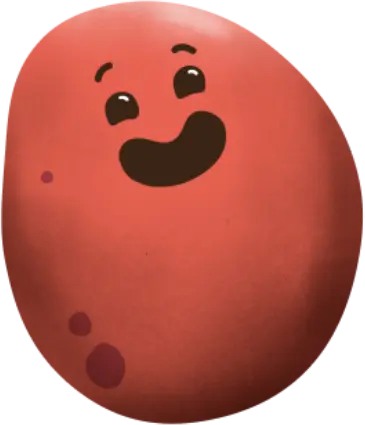Potatoes have taken a lot of slack in recent years. Fad diets and sub-par preparation methods have steered the health conscious away from these tuberous little root veggies. But for all you potato lovers out there who miss the buttery taste of the spud and long for it to make its debut on your health plate again, you are in luck!
You CAN have your potato and eat it too!
Little potatoes, that is. They may be the smallest potato on the block, but they pack a powerful nutritional punch and boast many health benefits. Here are some reasons why you should include them as part of a healthy diet.
1. Little Potatoes are Nutrient-Dense Vegetables
One of the most important things to note is that little potatoes are a nutritious VEGETABLE! Yes, vegetable. A real, whole food, grown in our earth, and a nutritionally dense one to boot. These tiny but mighty potatoes are conveniently packed with essential vitamins and minerals, including vitamin C, potassium, calcium and iron, helping to support a healthy body, boost the immune system and improve energy levels. Don’t let the size fool you. They are a fully mature vegetable and are bred to be small. So, although each potato contains only 20 calories(!), they are fully grown and highly nutritious—a win-win! Plus, because they are a plant-based food they contain fiber. Fiber helps to satiate hunger, keeping you fuller longer, and supports gut health. They are naturally gluten-free, and contain zero sodium and cholesterol.
2. little Potatoes Are Good for Heart Health
It’s hard not to love little potatoes when they give so much love back to our own heart! Little potatoes are a good source of heart healthy nutrients including potassium, vitamin C, and fiber.
One serving of little potatoes (roughly 5 to 6 potatoes) contains 650 to 680mg of potassium, depending on the variety. This is roughly 20% of the Daily Recommended Intake and are naturally sodium-free. Potassium’s role when it comes to heart health is huge. It helps trigger the bear-hug squeeze of the heart that results in a heartbeat. Getting enough potassium through your diet and reducing sodium intake helps to ease and lower systolic blood pressure, reducing the risk of heart disease and stroke.
Vitamin C is a powerful antioxidant that significantly helps to reduce inflammatory diseases like atherosclerosis. In addition to preventing arterial plaque build-up, vitamin C helps repair already damaged arteries. It also helps lower bad cholesterol levels to significantly reduce blood pressure.
The fiber found in little potatoes can help lower blood cholesterol levels. Fiber binds onto cholesterol, absorbs it, and helps your body eliminate it, making these Little potatoes a heart healthy powerhouse.
3. little Potatoes Contain Antioxidants
Little potatoes naturally contain antioxidant compounds such as vitamin C, phenols, carotenoids, and flavonoids. These antioxidants help counteract free radical damage, which if goes unchecked, can lead to premature aging and disease. The red and blue varietals hold even more antioxidant power as they also contain anthocyanins. Anthocyanins are powerful antioxidants that provide the red, purple and blue pigments. They slow down the aging process—not only physically, but mentally, by keeping the brain sharp and preventing neurological decline. Plus, they boast amazing anti-cancer properties and protect against diabetes. These antioxidants are found in both the skin and flesh—which is a good thing because you don’t have to peel Little potatoes—providing these perfectly packaged bite-sized Little potatoes with a powerful one-two punch.
4. little Potatoes Contribute to Gut Health
Many wouldn’t automatically think of potatoes as a food to help improve gut health, but they can! In addition to the fiber that helps keep the colon in check, little potatoes contain a type of starch known as “resistant starch”. This is type of starch is particularly increased when potatoes are cooled, after they have been cooked (potato salad, anyone?). Resistant starches ‘resist’ being broken down and digested in the small intestine. Instead, they act more like a prebiotic fiber that feeds good bacteria in the large intestine, improving gut health. They are also known to help control blood sugar levels and reduce the likelihood of insulin resistance.
So load up and feel great about eating Little potatoes. Your palate and health will thank you!



